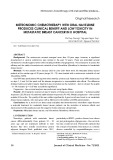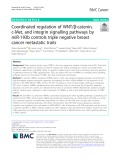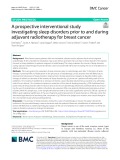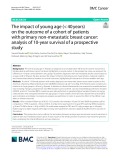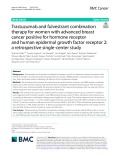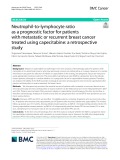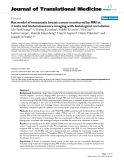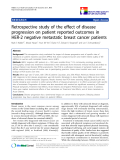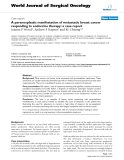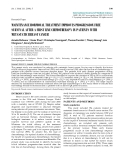
Metastatic breast cancer
-
The metronomic concept emerged more than 20 year sago, however, a significant development in various solidtumors was noticed in the past 10 years. There are potentially several mechanisms of action against tumor cells including inhibition of angiogenesis. This study aims to assess the efficacy and the safety of ametronomic schedule of oral Vinorelbine (Navelbine) in treatment of metastatic breast cancer.
 6p
6p  vinatisu
vinatisu
 29-08-2024
29-08-2024
 1
1
 0
0
 Download
Download
-
Triple negative breast cancer (TNBC) is the most aggressive subtype of breast cancer (BC). Treatment options for TNBC patients are limited and further insights into disease aetiology are needed to develop better therapeutic approaches. microRNAs’ ability to regulate multiple targets could hold a promising discovery approach to pathways relevant for TNBC aggressiveness.
 19p
19p  vielonmusk
vielonmusk
 21-01-2022
21-01-2022
 12
12
 0
0
 Download
Download
-
We investigated the clinicopathological characteristics and survival of breast cancer lung metastases (BCLM) patients at initial diagnosis of metastatic breast cancer (MBC) in the Han population.
 9p
9p  vielonmusk
vielonmusk
 21-01-2022
21-01-2022
 11
11
 2
2
 Download
Download
-
Most breast cancer patients with non-metastatic disease receive adjuvant local or loco-regional radiotherapy. To be scheduled for irradiation may cause distress and fears that can lead to sleep disorders. Few reports focused on sleep problems in patients assigned to radiotherapy.
 6p
6p  vielonmusk
vielonmusk
 21-01-2022
21-01-2022
 19
19
 0
0
 Download
Download
-
The role of young age (
 12p
12p  vielonmusk
vielonmusk
 21-01-2022
21-01-2022
 11
11
 0
0
 Download
Download
-
Trastuzumab and fulvestrant combination therapy is one of the treatment options for patients with hormone receptor- and human epidermal growth factor receptor 2 (HER2)-positive metastatic breast cancer; however, there are limited studies evaluating the efficacy of this combination therapy.
 7p
7p  vielonmusk
vielonmusk
 21-01-2022
21-01-2022
 18
18
 1
1
 Download
Download
-
Eribulin or capecitabine monotherapy is the next cytotoxic chemotherapy option for patients with metastatic or recurrent breast cancer who have previously received an anthracycline or a taxane. However, it is unclear what factors can guide the selection of eribulin or capecitabine in this setting, and prognostic factors are needed to guide appropriate treatment selection.
 10p
10p  vielonmusk
vielonmusk
 21-01-2022
21-01-2022
 15
15
 1
1
 Download
Download
-
Tuyển tập các báo cáo nghiên cứu về hóa học được đăng trên tạp chí sinh học quốc tế đề tài : Rat model of metastatic breast cancer monitored by MRI at 3 tesla and bioluminescence imaging with histological correlation
 10p
10p  dauphong3
dauphong3
 03-01-2012
03-01-2012
 55
55
 4
4
 Download
Download
-
Tuyển tập báo cáo các nghiên cứu khoa học quốc tế ngành y học dành cho các bạn tham khảo đề tài: Retrospective study of the effect of disease progression on patient reported outcomes in HER-2 negative metastatic breast cancer patients
 9p
9p  panasonic05
panasonic05
 23-12-2011
23-12-2011
 53
53
 3
3
 Download
Download
-
Tuyển tập báo cáo các nghiên cứu khoa học quốc tế ngành y học dành cho các bạn tham khảo đề tài: Sustained complete remission of human epidermal growth factor receptor 2-positive metastatic breast cancer in the liver during long-term trastuzumab (Herceptin) maintenance therapy in a woman: a case report
 4p
4p  toshiba25
toshiba25
 09-12-2011
09-12-2011
 61
61
 3
3
 Download
Download
-
Tuyển tập báo cáo các nghiên cứu khoa học quốc tế ngành y học dành cho các bạn tham khảo đề tài: A paraneoplastic manifestation of metastatic breast cancer responding to endocrine therapy: a case report
 3p
3p  matuot_238
matuot_238
 13-10-2011
13-10-2011
 80
80
 5
5
 Download
Download
-
Tuyển tập các báo cáo nghiên cứu khoa học ngành y học tạp chí Medical Sciences dành cho các bạn sinh viên ngành y tham khảo đề tài: MAINTENANCE HORMONAL TREATMENT IMPROVES PROGRESSION FREE SURVIVAL AFTER A FIRST LINE CHEMOTHERAPY IN PATIENTS WITH METASTATIC BREAST CANCER...
 6p
6p  thulanh8
thulanh8
 06-10-2011
06-10-2011
 43
43
 3
3
 Download
Download
-
Endocrine Therapy Normal breast tissue is estrogen-dependent. Both primary and metastatic breast cancer may retain this phenotype. The best means of ascertaining whether a breast cancer is hormone-dependent is through analysis of estrogen and progesterone receptor levels on the tumor. Tumors that are positive for the estrogen receptor and negative for the progesterone receptor have a response rate of ~30%. Tumors that have both receptors have a response rate approaching 70%. If neither receptor is present, the objective response rates are ...
 5p
5p  konheokonmummim
konheokonmummim
 03-12-2010
03-12-2010
 82
82
 4
4
 Download
Download
-
Chemotherapy Unlike many other epithelial malignancies, breast cancer responds to multiple chemotherapeutic agents, including anthracyclines, alkylating agents, taxanes, and antimetabolites. Multiple combinations of these agents have been found to improve response rates somewhat, but they have had little effect on duration of response or survival. The choice among multidrug combinations frequently depends on whether adjuvant chemotherapy was administered and, if so, what type.
 5p
5p  konheokonmummim
konheokonmummim
 03-12-2010
03-12-2010
 69
69
 3
3
 Download
Download
-
Estrogen receptors (ERs) and androgen receptors, members of the steroid hormone family of nuclear receptors, are targets of inhibition by drugs used to treat breast and prostate cancers, respectively. Tamoxifen, a partial agonist and antagonist of ER function, can mediate tumor regression in metastatic breast cancer and can prevent disease recurrence in the adjuvant setting, saving thousands of lives each year. Tamoxifen binds to the ER and modulates its transcriptional activity, inhibiting activity in the breast but promoting activity in bone and uterine epithelium.
 5p
5p  konheokonmummim
konheokonmummim
 03-12-2010
03-12-2010
 78
78
 5
5
 Download
Download
-
Neoplasms (See also Chap. 374) Back pain is the most common neurologic symptom in patients with systemic cancer and may be the presenting symptom. The cause is usually vertebral metastases. Metastatic carcinoma (breast, lung, prostate, thyroid, kidney, gastrointestinal tract), multiple myeloma, and non-Hodgkin's and Hodgkin's lymphomas frequently involve the spine. Cancer-related back pain tends to be constant, dull, unrelieved by rest, and worse at night. By contrast, mechanical low back pain usually improves with rest.
 5p
5p  ongxaemnumber1
ongxaemnumber1
 26-11-2010
26-11-2010
 110
110
 6
6
 Download
Download
CHỦ ĐỀ BẠN MUỐN TÌM








